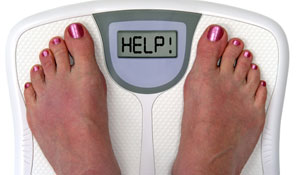
If you've been engaged in a long-term, losing battle with your bathroom scale, which seems stuck at the same weight no matter how little you eat, chances are you're feeling a bit defeated. Dieting down to what is considered your "ideal" weight can be fraught with frustration—and failure.
Just How Low Do You Need to Go?
First off, recognize that everyone has a "set point," a weight range that your body struggles to adhere to, says Vandana Sheth, RD, CDE, spokesperson for the Academy of Nutrition and Dietetics. "Just as your body is set at a certain temperature, we have a set point for weight," she says. "And if we try to push our set point to an unrealistically low weight, our bodies will reset at a higher level. And it becomes harder and harder to get to a lower weight."
But your "set point" is not set in stone. If you can achieve a 10 percent weight loss and maintain it for a period of six months, you have a good chance of keeping off the unwanted pounds. "Keeping the weight off can actually reduce your set point as your body adjusts to this new plateau," Sheth says.
Second, keep in mind that weight isn't the only criteria for calculating the ideal reading on the scale. "The percentage of body fat and its location is what counts," says Joy Dubost, PhD, RD, CSSD, spokesperson for the American Academy of Nutrition and Dietetics. "If you are pear-shaped, you are not at as great a risk for health problems than if you store fat in the abdominal region." Waist size is important as well, she says. If you are a woman and your waist measures more than 35 inches in diameter, or if you are a man with a waistline of more than 40 inches, this is a health risk.
Genetics must be factored in, too, Dubost says. "This is not to say that you can't overcome your genetic component," she explains. "With the right diet and physical activity, you can lose weight and be successful at it."
If you wonder whether you are at the weight you think you should be versus the weight you feel good at, consider how you feel, suggests Keri Gans, RD, author of The Small Change Diet. Take into account your energy level. "Numbers on a scale don't tell you everything," Gans says. "If you are physically active, consuming a healthy diet that includes plenty of fresh fruits and vegetables, and your latest blood tests were all normal, I wouldn't worry so much about your actual weight."
Finally, if you'd like to reduce your "set point," here's what you can do, Sheth says:
- Don't skip breakfast.
- At dinner, fill half your plate with colorful fruits and vegetables, one quarter with lean protein, and one quarter with whole grains.
- Enjoy long walks with a friend. If you exercise with someone else, you're more likely to stick with it in the long run.
Keri Gans, RD, reviewed this article.
Source:
Narins, Elizabeth. "How to find your happy weight." 27 November 2012. Women's Health.
http://blog.womenshealthmag.com/thisjustin/how-to-find-your-happy-weight/





